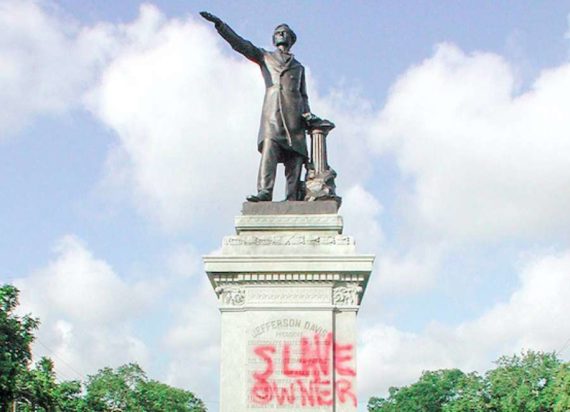Early this morning the local television station WRAL, Raleigh, NC, broadcast news that the first of “four Confederate monuments in New Orleans…honoring white supremacy” will come down today.
The fate of these monuments has been debated now for a number of years, with the majority black city government wanting to expunge these reminders of New Orleans’ history, while various heritage and preservation organizations have fought to keep them in place.
The one that comes down today is the “Liberty Monument,” an obelisk erected in 1891 to commemorate the overthrow of Reconstruction. Proponents argued that it is a symbol of “white supremacy” and racism, while defenders declared that, although it may be offensive to some, it also an integral part of the city’s history and, thus, should be kept where it is as a part of that history.
But it is the remaining three monuments that raise the most vociferous ire of traditionalists and those concerned about preserving the historical record: the city plans to take down statues to Generals Robert E. Lee and P. G. T. Beauregard, and President Jefferson Davis.
Unlike the Liberty Monument, which symbolizes the political redemption of the city from Reconstruction, the Lee, Beauregard and Davis monuments commemorate exemplary individuals who ended up defending a lost cause. Through honoring them, the city fathers had honored the soldiers and the extreme sacrifices and hardships endured during a brutal war 155 years ago. But, as we know, history often does not treat well the champions of a lost cause; the victors usually write the histories and establish the narrative.
The effort to take down these symbols reflects a frenzied desire to, in effect, efface portions of our history, to revise the past, if it no longer comports with the ideological Marxist vision that is currently fashionable and politically-correct. Certainly, one can argue that each generation engages in a bit of revising; that is part and parcel of what human beings do, to enhance their history and their genealogy, while downplaying events and individuals that may not fit smoothly into the current narrative.
Those who argue that the New Orleans monuments should come down suggest that what is needed is a re-interpretation and a revised view of history, and that such monuments only serve to remind us of past “sins” of racism and white oppression, slavery, and rebellion.
Yet, a deeper issue demands consideration. What does such zealous “purification,” such “censorship,” such abrupt dislocation, do to our understanding of who we are as a people? What happens when we radically suppress, re-arrange, and expel integral portions of our past? Does not such extreme surgery leave us bereft of a fuller understanding of our historical experience?
The great late nineteenth century Spanish philosopher, Marcel Menendez y Pelayo, once said of Spain, that it was the shining champion, buckler, and defender of Christendom: “this is your heritage, you have no other,” he cautioned. Cannot this same metaphor be applied to the South? Can there be, truly, a real South without not only monuments commemorating noble men like Robert E. Lee, but also an understanding that men like Lee and Davis and Beauregard occupy a pivotal role in our history, and that their vision and their lives were exemplary and admirable witnesses in the difficult historical era in which they lived? Must everything be compressed and re-interpreted by a sharply defined, ideological historicist litmus test?
Where, indeed, does such a process of homogenization and re-writing stop? George Washington, Thomas Jefferson, and other Founders of this nation were slave holders; must their monuments be taken down and their names suppressed, too? Must their legacies be radically revised, and their essential roles in the creation of this nation be ideologically perverted? The triumphant cultural Marxist school of historical writing, the Eric Foners of the historical establishment, would have it so, and in so doing, they turn history into fanatical ideology. Hollywood and the dominant popular culture follow along like yelping pups, parroting in offensive and over-the-top exaggeration the new dogmatism that reigns nearly supreme.
One cannot transgress the new totalitarian dogmatism. Not only our media, our entertainment, and our educational establishment, but even some of our friends who should know better, participate in this insane brainwashing acceptance that warps our understanding of our past.
Our objective, then, must be to redeem our history, recover the past, paint it in all its colors; but keep all our monuments and all our artifacts up and visible, recognizing that not everyone will see them in the same light. Yet, even those symbols that some may find objectionable tell a story and open a window on our past. And to comprehend who we are, we neglect such a full vision at our great peril. A people without a past, that is, a real and discernible history, is a people with no real future.







